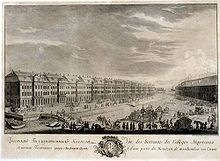Collegium (ministry)

The Collegium (
Origin
Following the formation of the Governing Senate in 1711, the Tsar Peter I sought to make more reforms on the imperial government bodies. He planned to replace the Prikaz with a new type of government agency, based on two new principles:
- Systematic separation of departments, in order to avoid overlapping/omission of certain governmental duties under the Prikaz system;
- Advisory procedure for resolving cases.
Similar form of central government institutions were adopted in Sweden and a number of German states. In 1717, Collegium was introduced based on the Swedish Kollegium.[1]
History
- 1717 - Establishment of the 8 following Collegiums: Collegium of Foreign Affairs, College of War, Collegium of State Income, Collegium of Justice, Collegium of Commerce, Collegium of State Expenses, Collegium of Mining and Manufacturing, and Collegium of Accounting.
- 1718 - Establishment of the Admiralty Board, as well as a special collegium to administer the newly acquired territories along the Baltic Sea.[2]
- 1720 - Publication of the General Regulations (Russian: Генеральный регламент), which, among other things, made the following changes:
- 1721 - Establishment of the Collegium of Estates.
- 1722 - Division of Collegium of Mining and Manufacturing into the Collegium of Mining and the Collegium of Manufacturing.
- 1726 - Establishment of the Collegium of Economics (Russian: Коллегия экономии).[5]
- 1763 - Establishment of the Collgium of Medicine (Russian: Медицинская коллегия).[1]
- 1780s - As a result of the local government reform carried out by Catherine the Great, the number of collegiums was sharply reduced, and their functions were transferred to provincial institutions.
- 1802 - Passage of the Manifesto on the Establishment of Ministries by Alexander I of Russia, which incorporated the collegiums into newly created ministries.
Regulations
The activities of the collegiums were determined by the General Regulations, which was approved by Peter I on February 28 (March 10 on Gregorian calendar), 1720.
The General Regulations instituted a set of office administration rules for the collegium. Each collegium was to be consisted of advisers and assessors, and headed by presidents and vice-presidents. The decisions of the collegium need to be debated on, received majority approval, and signed by all members present.[1] Peter I paid special attention to this form of decision-making, noting that “every better arrangement happens through councils” (Chapter 2 of the General Regulations “On the advantage of colleges”).[6]
Internal structure
Each collegium consisted of the following staff:
- President: Head of a collegium, but could not make decisions without the consent of the other members. Appointed by the Governing Senate with consent from the Tsar.[7]
- Vice President: Assistant of the president in performing duties of the collegium, and could stand in for the president during the latter's absence. Appointed by the Governing Senate.
- 4 advisers
- 4 assessors
- 1 prosecutor
- 1 secretary
- 1 actuary
- 1 registrar
- 1 translator
- Clerks
Meeting were held daily, exceot for Sundays and public holidays. they started at 6 A.M. or 8 A.M. depending on the season, and usually lasted 5 hours.
Materials for the boards were prepared in the Office of the collegium, and were then transferred to the General Presence, where they were discussed and adopted by a majority of the votes. Issues on which the collegium failed to make a decision were referred to the Senate, the only institution to which the collegiums were subordinate to.[7]
See also
References
- ^ a b c d "КОЛЛЕГИИ • Большая российская энциклопедия - электронная версия" [COLLEGIUM • Great Russian encyclopedia - electronic version]. Bigenc.ru (in Russian). Archived from the original on 2022-10-20. Retrieved 2023-06-05.
- ^ "Присоединение Прибалтики к России, Эстляндия и Лифляндия в составе России" [Accession of the Baltic States to Russia, Estonia and Livonia as part of Russia]. frg.ulver.com (in Russian). Archived from the original on 2007-06-30. Retrieved 2023-06-05.
- ^ "Юстиц-коллегия Лифляндских, Эстляндских и Финляндских дел и государственная система Российской империи в начале XIX века (Историко-правовой аспект)" [Justice Collegium of Livonian, Estonian and Finnish Affairs and the State System of the Russian Empire at the Beginning of the 19th Century (Historical and Legal Aspect)]. rusnauka.com (in Russian). Retrieved 2023-06-05.
- ^ "Главный магистрат" [Chief Magistrate]. Encyclopedia of St. Petersburg (in Russian). Retrieved 2023-06-05.
- ^ "ЭКОНОМИИ КОЛЛЕГИИ • Большая российская энциклопедия - электронная версия" [SAVINGS OF THE COLLEGE • Great Russian encyclopedia - electronic version]. old.bigenc.ru (in Russian). Retrieved 2023-06-05.
- ^ "ГЕНЕРАЛЬНЫЙ РЕГЛАМЕНТ 1720 • Большая российская энциклопедия - электронная версия" [GENERAL REGULATIONS 1720 • Great Russian encyclopedia - electronic version]. bigenc.ru (in Russian). Archived from the original on 2022-10-19. Retrieved 2023-06-05.
- ^ a b "СЕНАТ • Большая российская энциклопедия - электронная версия" [СЕНАТ • Большая российская энциклопедия - электронная версия] (in Russian). Archived from the original on 2022-10-19. Retrieved 2023-06-05.
